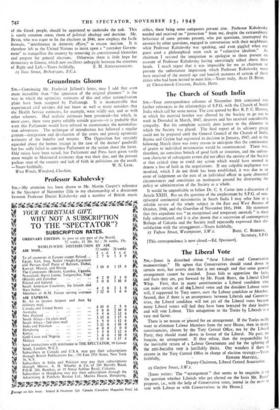The Liberal Vote I12,—Janus is disturbed about "these Liberal and
Conservative manoeuvrings." He agrees that Conservatives should stand down in certain seats, but asserts that that is not enough and that some general arrangement cannot be avoided. Janus fails to appreciate the facts, and facts they are, put forward by Mr. Frank Bycrs, the Liberal Chief Whip. First, that in many constituencies a Liberal candidate who can make certain of all the( Liberal votes and the dissident Labour votes will, if supported by Tory voters, oust the Labour candidate or Member. Second, that if there is an arrangement between Liberals and Conserva- tives, the Liberal candidate will not get all the Liberal votes because many Liberal voters will feel they have been betrayed by their leaders and will vote Labour. This antagonism to the Tories by Liberals is a very real factor.
There is no reason or ground for an arrangement. If the Tories really want to eliminate Labour Members from the next House, then in many constituencies, chosen by the Tory Central Office, not by the Liberal Party, they should stand down in favour of the Liberal. No pact, no bargain, no arrangement. If they refuse, then the responsibility for the inevitable return of a Labour Government and for the splitting of the anti-Socialist vote is justifiably theirs. One wonders if there is anyone in the Tory Central Office in charge of election strategy.—Youss faithfully, EDWARD MARTELL) Deputy-Chairman, Liberal Central Association. 23 Gayfere Street, S.W.i.
[Janus writes: The " arrangement " that seems to be requisite is on the question whether Liberals who get elected on the basis Mr. Byers' proposes, i.e., with the help of Conservative votes, intend in the !Win to vote with Labour or with Conservatives in the House.]






































 Previous page
Previous page